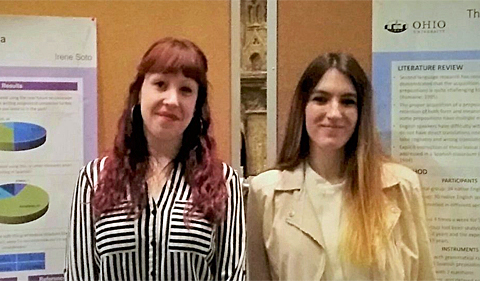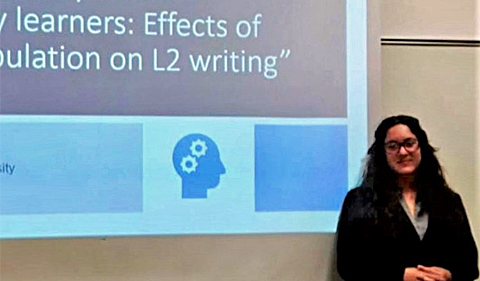Linguistics graduate students Irene Soto, Sofía Fernandez and Carla Consolini presented individually at the prestigious Second Language Research Forum last October in Montréal, Canada.
They also attended presentations by famous scholars in the field of second language acquisition, such as Dr. Rod Ellis and Dr. Aneta Pavlenko, among others.
Soto’s presentation was titled “The use of the near-future construction in Spanish as a foreign language.” She presented a research study from the previous semester that analyses the phenomenon of linguistic avoidance in second language acquisition and focuses on the avoidance of the near-future construction by learners of Spanish as a foreign language, looking at U.S. university students’ writing tasks.
“I found SLRF to be a very enriching learning experience,” Soto said, adding that it was a great opportunity to present her own research, to talk to other professors and graduate students from many different universities and with different interests and areas of expertise, and to learn from the work of other scholars in a dynamic and friendly environment.
Fernandez’s presentation was titled “The role of explicit instruction in the acquisition of Spanish prepositions.” Her research study investigated the effect of explicit instruction on student’s acquisition of five Spanish prepositions. She focused on how prepositional forms represent different levels of difficulty and the importance of repetitive instruction to increase retention. While presenting, she had the incredible experience of discussing her work with professors and colleagues who investigate the teaching of Spanish prepositions. She was thrilled to attend renowned applied linguist Ellis’ plenary talk, “Oral corrective feedback in SLA: Taking a holistic perspective.” She noted that “it was a remarkable experience after reading about his work in many classes.” She also found SLRF a great opportunity to see what other students are investigating in different universities and to learn from their work.
Carla Consolini’s presentation was titled “Task complexity in low-proficiency learners: Effects of task manipulation on L2 writing.” Her research study looks to help students identify new morphosyntactic forms in complex tasks to aid in second language acquisition.
“I learned a lot about the development of forensic linguistics while attending Dr. Pavlenko’s talk. It was very stimulating to listen to Ph.D. students talk about their research as well,” she said.





















Comments